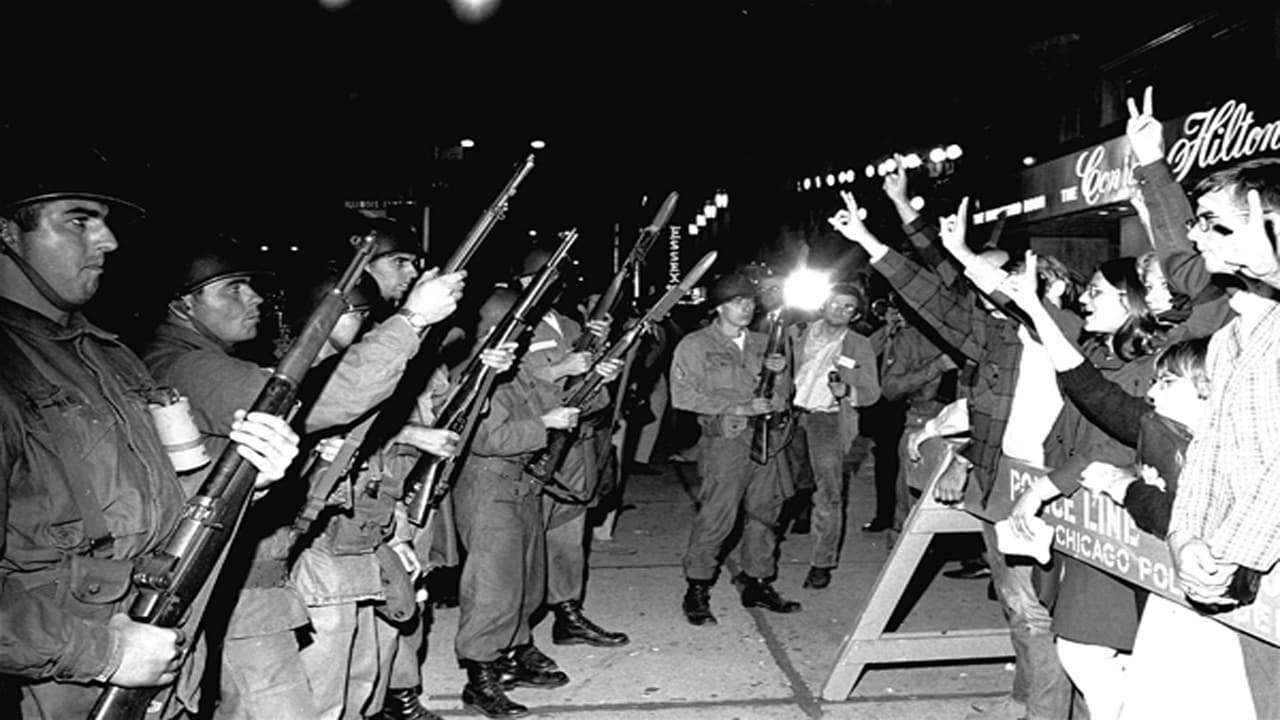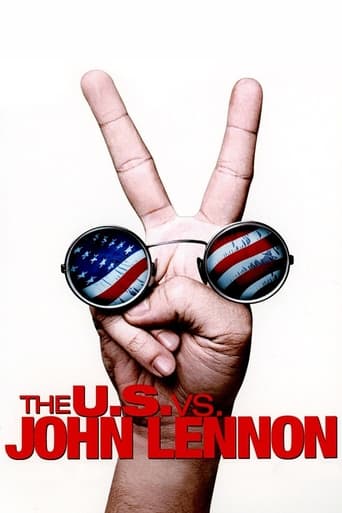TrueHello
Fun premise, good actors, bad writing. This film seemed to have potential at the beginning but it quickly devolves into a trite action film. Ultimately it's very boring.
Gurlyndrobb
While it doesn't offer any answers, it both thrills and makes you think.
Sameer Callahan
It really made me laugh, but for some moments I was tearing up because I could relate so much.
Jerrie
It's a good bad... and worth a popcorn matinée. While it's easy to lament what could have been...
RainDogJr
A concert made in order to ask the freedom of John Sinclair. Lennon was there and here begins The U.S. vs. John Lennon, a very entertaining and interesting documentary that first take us to what we already knew about Lennon to end focusing in his deportation problem. The reason of that problem is clear and obvious; the powerful footage is here and the picture features interviews with persons from that side and from the other side (close friends, historians, journalists, veterans, activists, senators, FBI ex-agents, Yoko Ono, etc) and that is quite interesting to hear persons that used to think quite different about Lennon but now those persons, in a neutral side, are glad that Lennon could won, partially. That interesting footage shows Lennon as we remember him and his music was, is and will be very powerful. The "Give Peace a Chance" part is amazing -John Lennon: If I'm going to get on the front page, I might as well get on the front page with the word peace. –Gloria Emerson: but you've made yourself ridiculous! –JL: to some people. I don't care if it saves lives. –GE: you don't think you, oh my dear boy you're living in a never-never land you don't think you've saved a single life?–JL: what were they singing in the moratorium? Give Peace a Chance And I'm glad they sang it AND WHEN I GET THERE I'LL SING IT WITH THEMThe "Mother" part, near the beginning, too and also I found perfect "Here We Go Again" during the part of the reelection of Nixon. "Instant Karma" (one of my personal favourites songs of Lennon) is at the credits of this documentary and made me stay watching and listening until the very end.Conclusion: The U.S. vs. John Lennon is a recommendable picture. Lennon was an admirable person and here his believes and his music are very well presented and the footage is great yet known since we already know who was Lennon and the main subject is interesting but obvious since, knowing who was Lennon, is easy to think the real reasons of why they wanted him outside the U.S. Anyway, I liked it a lot and I hope you can check it out. John Lennon (1940-1980)
MisterWhiplash
The central premise of The US vs John Lennon (the latter as described in the Departed, of all movies, semi-sarcastically as "the president before Lincoln") is that public figures are always up for grabs if they come out on either side of the fence. Lennon was fervently anti-war- if very unsure about going all the way into the dangerous political zone (hence not going, wisely enough, to the violent demonstration that happened at the 1972 Republican convention)- and because of his connection with various people like Jerry Rubin and Abby Hoffmann, as well as questionable ties with the Black Panthers, he was monitored openly, and threatened with deportation for a bogus pot arrest in 1968. Nixon, meanwhile, was one of the all-time nut-job presidents when it came to the military, who ran in 68 on an "I'll-end-the-war-honorably" ticket and instead kept the war going for years, including invading Cambodia.Many of the facts brought up in this documentary aren't new, especially to those who were alive during the time it happened and the media went all over Lennon (so it goes in today's tabloids as well, only here it was some kind of real news). But they are presented compelling enough so that they can offer up some bits of insights for newer audiences to Lennon's music and politics. To be sure, it is a slanted argument, but slanted for the right reasons (you're bound to not find anyone in a doc like this saying "oh, Vietnam, not so bad", unless maybe Liddy). Yet the argument holds strong throughout, about the nature of political practice and the ideals of changing things not going well with the establishment. And there are questions raised for the audience, if not directly: should Lennon, who technically wasn't American, be apart of a movement that was going on, or just stuck to doing his songs and music? (The filmmakers, by the way, wisely cut out much at all to do with the Beatles, albeit they kind of skirmish past the whole issue of "Beatles bigger than Jesus" when it's presented more as a footnote of the outspoken side of Lennon than connecting to the main focus).It's interesting though to see the footage of the "bed-in", when Lennon and Ono did almost a kind of tour of protest-by-lethargy, and had the press in there as part of the ironic-not-quite-joke of the matter. And there's also fascination in seeing Lennon describe, candidly in archival interviews, the toll the media blitz and upheaval from the government had on him. Only towards the end do the directors start to waver the attention a little bit, even as it is, to be sure, part of the story of Lennon and his eventual tragic death in 1980. But the core idea behind the documentary is one that will always pose something that the viewer should look for: what is it about two unlikely connected figures- popular celebrity musician-cum-activist and one of the craziest presidents this country ever had- that still seems relevant today? Can people take away anything from Lennon's struggle with the powers-that-be? It might be a little obvious (i.e. getting past apathetic stances and doing nothing to just trying to do 'something'), but the point is made nonetheless in the film, and not in a manner that is too schmaltzy or heavy-handed. Just make sure you don't have a BS drug bust to worry about.
njmollo
The U.S. vs. John LennonI have nothing but problems with this documentary. Firstly, this is a manipulated version of the events. The seal of 'Authorized' has cost this documentary its impartiality and honesty.This documentary has all the hallmarks of a Yoko Ono production. She is portrayed as a sympathetic talented artist with a heart of gold and inseparable if not the catalyst of John Lennon's emerging talent. So the message of this poor documentary is that 'John would have been nothing without Yoko!'Not once is Julian Lennon mentioned in this perversion of History. Julian suffered all his young life with the pain of being ignored and rejected by his own Father. Yet when Yoko's son is born it is reported as if this experience is revelatory and the only one of significance. John and Yoko were having relationship problems before he died. In fact John was sleeping with another Asian girl introduced to him by Yoko. When John started to fall for her, Yoko terminated the relationship.It is a crime that John Lennon's legacy and fortune are in the hands of Yoko Ono who has proved on numerous occasions how morally malleable she is. Julian Lennon on the other hand is forced to go to auctions to bid for articles that once belonged to his dad. He still to this day not received a penny of John Lennon's wealth.The final insult to John's memory is having a sell-out like Geraldo Rivera comment on his life.
Apple Scruff
There is a lot that I love about John Lennon, and a lot that I don't like much about him. I was interested in this film initially, but was not all that impressed. I'll try to explain my problems with it. I suppose I should start by saying that it is not all bad, but anybody who looks at this as "the" documentary on Lennon is grossly misinformed.In a nutshell, nearly everything in the film had all been said before. It was the first time I felt like I was watching a remake of a documentary! Some people claimed that it was the first time this part of Lennon's life was shown in a documentary, but there was absolutely nothing in this film that hadn't been said elsewhere, be it on film or in a book.I hated the overused "talking-heads" format. I had no need to hear what Gore Vidal had to say, particularly when he went on about Lennon representing "life" and Nixon and George Bush representing "death". Whatever. I'm not their biggest fan either, but that was pure sensationalism. It's not clear which Bush he was talking about, but Vidal takes every chance he gets to make pompous, oversimplified statements like that.Geraldo Rivera? You've got to be kidding! I just wasn't always sure if the film had anything more to say than "John Lennon ruled and Richard Nixon sucked." Does anybody who is going to see this film really need to be told that to the degree that this film tells the audience? While I'm at it, I hated the film's ad campaign. It centered upon the above Vidal quote and counted on people who didn't do their own thinking to applaud it as wholly original and profound. The fact that it bastardized "War Is Over... If You Want It" by making it the film's tagline irritated me, especially since the film wasn't supposed to be about war! Even if you read into it and say that it was about a war between Nixon and Lennon, I still say that's a flimsy reason.David Leaf is usually much more impressive than this. I, for one, value his work as Brian Wilson's biographer. This film, however, just seemed to be capitalizing on the current documentary craze. It used to be that a viewer could be enlightened and educated by almost every documentary that made its way into cinemas. Not anymore, though. This one simply staples together other, BETTER documentaries about the same stuff. Want to learn about Lennon? Read a book. Watch better Lennon documentaries like Imagine: John Lennon. That film wasn't perfect either, but at least it showed John at his best and at his worst. The U.S. vs. John Lennon is simply John worship that spends so much time treating him like a legend, it forgets to treat him like a man.I probably would not have felt so negatively had I seen this one on television instead of in a cinema. It was partly produced by VH1, and that's really where it belongs. At least on VH1, it can be taken with a grain of salt alongside I Love the 80s: 1982 and Flava of Love. (Okay, okay, that last part was pretty low, I admit it. I apologize.) I can't say that I hated the whole thing. There were some pretty interesting interviews, particularly the one with John Sinclair. His contribution was the best part of the film. They also made at least some efforts (i.e. two or three I think) to bring in opposing viewpoints so they could say they were being objective.Above everything else, it is always a pleasure to listen to Lennon, even when he wasn't thinking much about what he said. Yes, friends, even Lennons make mistakes. Either way, his interviews were pretty well used in this film. I walked away really wishing that John were still around to state his case for himself retrospectively.

